Welcome to Feathered Foodies, where we delve into the culinary curiosities of chickens and explore what they can safely munch on. In this comprehensive guide, we will answer the burning question: Can chickens eat this? From fruits and vegetables to nuts and seeds, we will cover it all to ensure your feathered friends have a well-rounded diet.
- Chickens can safely enjoy a variety of foods such as mealworms, acorn squash, alfalfa, almonds, apples, bananas, basil, bell peppers, blackberries, blueberries, broccoli, Brussels sprouts, cabbage, cantaloupe, and carrots.
- They should avoid raw beans, salty foods, moldy foods, and large portions of uncooked meat.
- A high-quality feed should be the main source of nutrients for chickens.
- Ensure your feathered friends have a balanced diet by providing them with proper supplementation and high-quality chicken feed.
- While chickens can enjoy a wide range of foods, there are some items that should be kept away from their beaks. Be aware of foods that are dangerous or unhealthy for chickens.
The Berry Bonanza: Can Chickens Eat Blueberries?
Chickens can indeed enjoy the juicy goodness of blueberries as a tasty and nutritious treat. These plump, sweet berries are not only a delight for us humans but can also provide numerous health benefits for our feathered friends. Blueberries are packed with antioxidants, vitamins, and minerals that promote overall wellness and boost their immune systems.
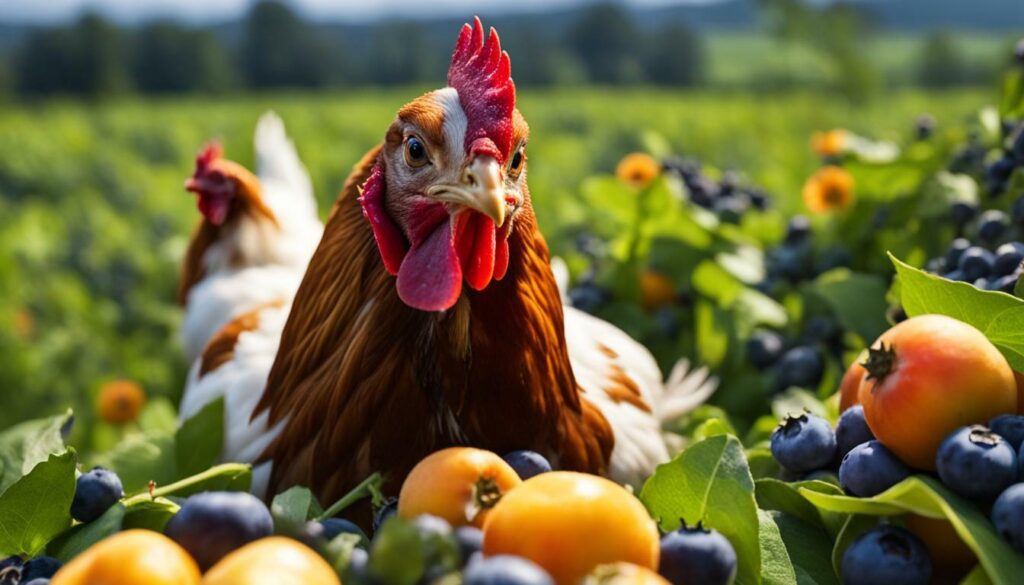
Feeding blueberries to your chickens can be a fun and enriching experience. You can offer them fresh or frozen blueberries, both of which they will eagerly gobble up. Remember to introduce new foods gradually to avoid any digestive issues.
To make it easier for you to incorporate blueberries into your flock’s diet, here’s a table summarizing the key points:
| Food | Cooking style | Serving size |
|---|---|---|
| Blueberries | Fresh or frozen | 2-3 blueberries per chicken per day |
“Blueberries are not only a tasty and nutritious treat for chickens but also provide numerous health benefits.”
Aside from blueberries, there is a wide variety of other foods that chickens can safely enjoy. From vegetables like broccoli and bell peppers to fruits like apples and bananas, you can create a diverse and well-rounded diet for your feathered friends. However, it’s important to avoid feeding them raw beans, salty foods, moldy foods, and large portions of uncooked meat.
While fresh foods like blueberries are a great addition to their diet, it’s essential to remember that a high-quality feed should be the main source of nutrients for chickens. A balanced and nutritionally complete feed ensures that they receive all the essential vitamins, minerals, and proteins they need to thrive.
Mango Madness: Can Chickens Eat Mango?
While chickens can eat mango in moderation, it’s important to remember a few things before including this tropical fruit in their meals. Mangoes are packed with vitamins A and C, which can provide a boost to your feathered friends’ immune system and promote healthy growth. The succulent flesh of a ripe mango can be a refreshing treat on a hot summer day, making it a delightful addition to their diet.
However, it’s crucial to prepare the mango properly for your chickens. Remove the skin and pit, as they can be a choking hazard. Cut the mango into small, bite-sized pieces to ensure easy digestion. Always offer fresh mango to your chickens and avoid feeding them any spoiled or overripe fruit.
To give you a better idea of the nutritional content of mangoes, here’s a breakdown of their key elements:
| Nutrient | Amount per 100g |
|---|---|
| Calories | 60 |
| Protein | 0.8g |
| Fat | 0.4g |
| Carbohydrates | 15g |
| Fiber | 1.6g |
As with any new food, it’s essential to introduce mangoes gradually into your chickens’ diet. Monitor their reaction and digestive health after offering them mango for the first time. If you notice any adverse effects, such as diarrhea or an upset stomach, it’s best to discontinue feeding mangoes to your chickens.
Remember, while mangoes can be a nutritious addition to your chickens’ diet, they shouldn’t replace their main source of nutrition. A high-quality feed specially formulated for chickens should still be the primary source of nutrients to ensure their optimal health and well-being.
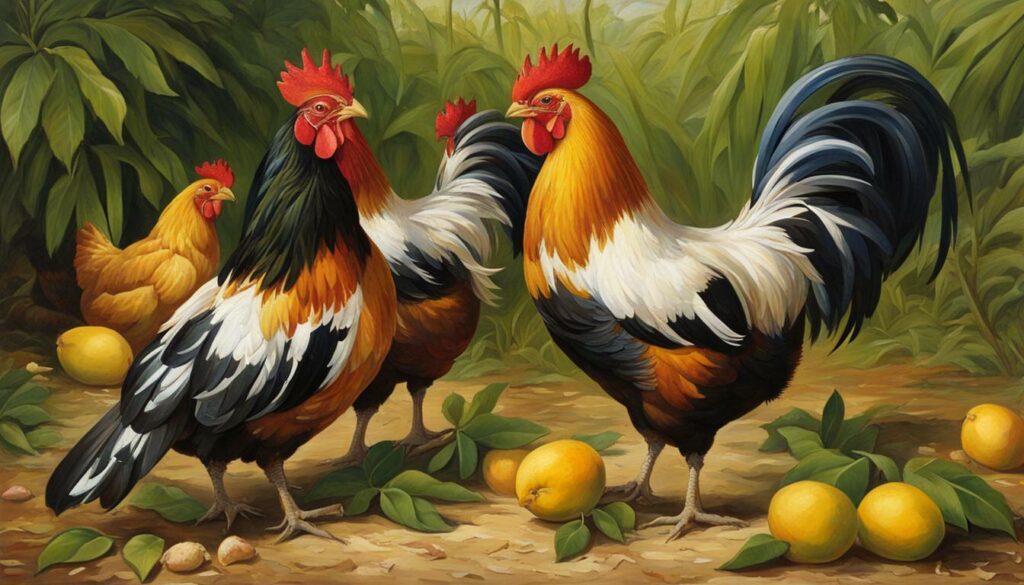
By following these guidelines, you can safely introduce mangoes to your chickens’ diet and give them a tropical treat they can enjoy. Just remember to offer mango in moderation and incorporate it as a part of their balanced diet. Your feathered friends will surely appreciate the sweet and juicy addition to their menu!
Thyme for Chickens: Can Chickens Eat Thyme?
Thyme, the fragrant herb often used in cooking, can also provide some health benefits for chickens when used sparingly and in the right way. While chickens primarily rely on a balanced chicken feed for their nutritional needs, incorporating herbs like thyme into their diet can offer some additional advantages.
Thyme contains essential oils that possess antimicrobial and antioxidant properties, which can support chickens’ immune system and overall well-being. It can also act as a natural dewormer, helping to control internal parasites in your flock. However, it’s crucial to remember that moderation is key. Too much thyme can lead to an overpowering taste in eggs, affecting their desirability for consumption.
To introduce thyme to your chickens’ diet, consider using it as a seasoning in their feed or as a sprinkle on top of treats. Fresh or dried, thyme can be finely chopped and mixed with other herbs for a flavorful blend. Remember, though, to always provide a diverse and balanced diet, including a variety of fruits, vegetables, and grains, along with access to clean water.
Benefits of Thyme for Chickens
When used appropriately, thyme can offer several benefits to chickens:
- Supports the immune system
- Acts as a natural dewormer
- Provides antioxidants
- Enhances the flavor of eggs
The key to using thyme effectively is to provide it in moderation. Too much thyme can overpower the taste of eggs, making them less desirable. Incorporate thyme into your chickens’ diet sparingly, and monitor their response to ensure it agrees with their digestive system.
| Herb | Benefits |
|---|---|
| Thyme | Supports the immune system, acts as a natural dewormer, provides antioxidants, enhances the flavor of eggs |
| Basil | Antimicrobial properties, aids digestion, helps repel insects |
| Mint | Calms the digestive system, repels pests, offers a refreshing flavor |
Remember, providing a balanced diet and maintaining good husbandry practices are essential for the health and well-being of your chickens. If you have any concerns or questions about incorporating herbs like thyme into their diet, it’s always best to consult with a veterinarian or poultry expert.
By offering a varied and nutritious diet, including appropriate herbs like thyme, you can ensure your feathered friends lead happy and healthier lives. So, go ahead and sprinkle some thyme on their treats or mix it into their feed, but always remember to do so in moderation.
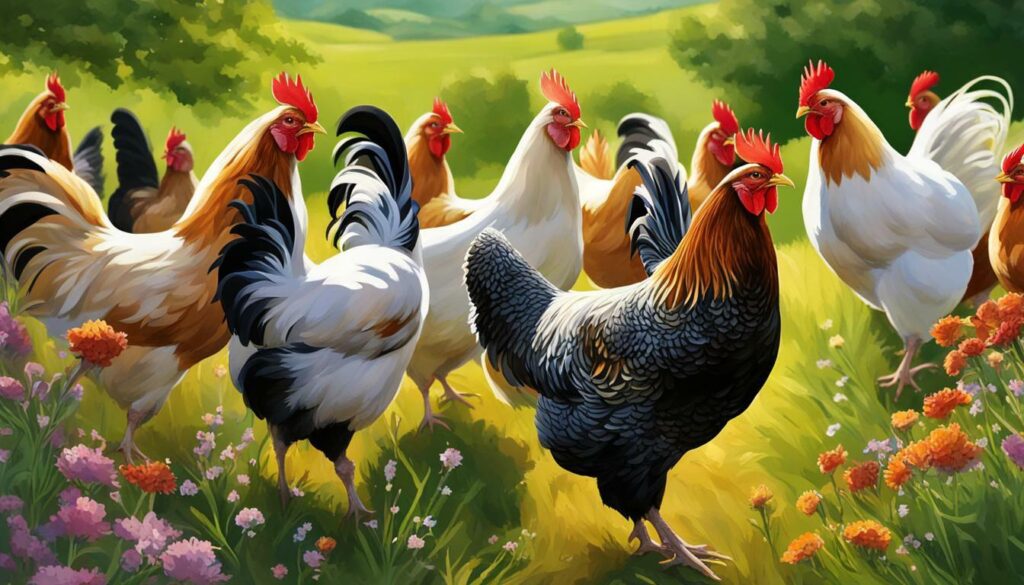
While chia seeds have nutritional value, chickens do not necessarily need them in their diet to stay healthy. These tiny seeds may be a trendy superfood for humans, but they are not an essential addition to a chicken’s menu. However, that doesn’t mean you can’t offer chia seeds to your feathered friends as an occasional treat or dietary supplement.
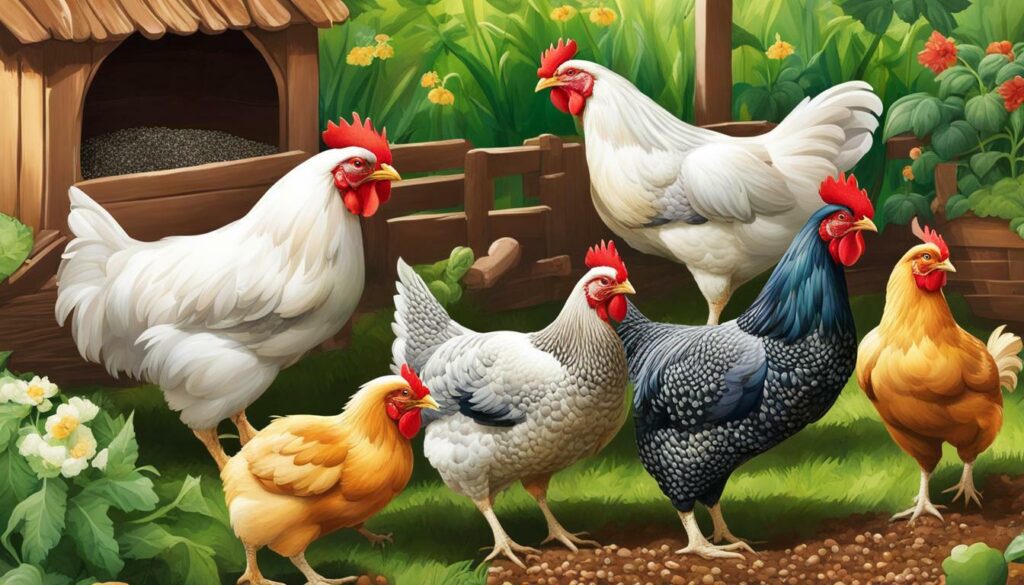
Chia seeds are rich in omega-3 fatty acids, protein, and fiber, which can provide some benefits to chickens when consumed in moderation. Omega-3 fatty acids support healthy feather growth, while protein aids in muscle development. Additionally, the fiber in chia seeds can assist with digestion.
When feeding chia seeds to chickens, it’s important to remember that moderation is key. A small amount of chia seeds sprinkled on their regular feed or mixed into treats can be a nutritious addition. However, feeding excessive amounts of chia seeds could lead to digestive issues or imbalances in their diet.
To ensure your chickens receive a well-rounded and balanced diet, it is best to focus on providing them with a high-quality chicken feed that is specifically formulated to meet their nutritional needs. This feed typically contains a balanced mix of grains, vitamins, and minerals that are essential for their overall health and egg production. Supplementing their feed with occasional treats like chia seeds can add variety to their diet, but it should not replace their main source of nutrients.
“While chia seeds can be a nutritious addition to a chicken’s diet, they are not a necessary component. Concentrating on a well-balanced feed is the key to ensuring that your flock receives all the necessary nutrients for optimal health and egg-laying.”
| Chia Seeds: A Superfood for Chickens? |
|---|
| Chia seeds are nutrient-rich and can provide omega-3 fatty acids, protein, and fiber to chickens. |
| Feeding chia seeds in moderation can be beneficial for a chicken’s feather growth, muscle development, and digestion. |
| However, chia seeds should not replace a high-quality chicken feed that is specifically formulated to meet their nutritional needs. |
| Focus on providing a balanced diet and use chia seeds as an occasional treat or supplement. |
Nutty Delights: Can Chickens Eat Almonds?
Chickens can eat almonds, but there are some considerations to keep in mind to ensure their safety. Almonds are a delicious and nutritious nut that many of us enjoy as a snack, but can our feathered friends indulge in this nutty delight? Let’s explore if almonds can be a tasty addition to your flock’s diet.
Almonds are packed with essential nutrients like protein, fiber, and healthy fats, making them a healthy snack for humans. However, for chickens, it’s important to offer almonds in moderation. Their small size can pose a choking hazard if they are not properly crushed or finely ground. To make it easier for chickens to eat, you can crush the almonds or grind them into smaller pieces before offering them as a treat.
In addition to their nutritional benefits, almonds can provide mental stimulation for chickens. Scatter crushed almonds in their coop or run, and watch as they eagerly peck and scratch to find every tasty morsel. It’s like a treasure hunt that keeps your flock entertained and engaged. Just remember, almonds should only be given as an occasional treat and not as a substitute for a balanced diet of chicken feed.
| Can Chickens Eat Almonds? |
|---|
| Yes |
While almonds are generally safe for chickens to eat, it’s essential to keep a few things in mind:
- Variety: Almonds should be offered as part of a diverse treat menu. Rotate different foods to ensure your chickens receive a balanced diet with a mix of nutrients.
- Avoid Salted or Flavored Almonds: Stick to plain, unsalted almonds for chickens. Added salt and flavors can be harmful to their health.
- Avoid Moldy Almonds: Only offer fresh, high-quality almonds to your flock. Moldy almonds can cause digestive issues and should be avoided.
- Monitor Intake: Chickens should not consume large quantities of almonds, as it can lead to an imbalance in their diet. Moderation is key.
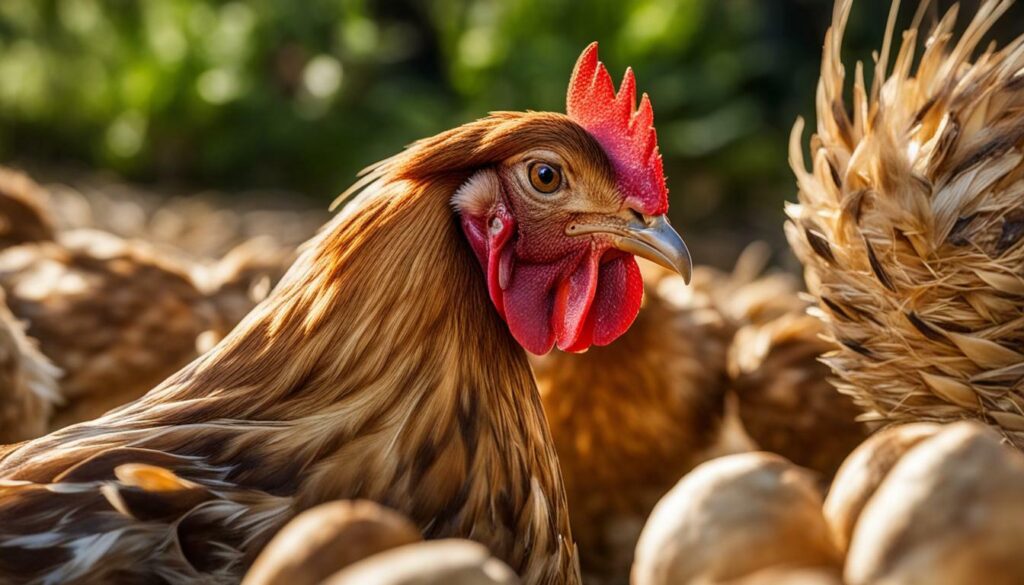
Remember, while almonds can be a delightful treat for your chickens, it’s important to prioritize a balanced diet. High-quality chicken feed should be the main source of nutrients for your flock, supplemented with occasional treats like almonds. With careful consideration and variety in their diet, your feathered friends can enjoy the nutty delights of almonds in a safe and healthy way.
Watermelon Wonder: Can Chickens Eat Watermelon?
Chickens can indeed enjoy the juicy delight of watermelon, making it a perfect treat on hot summer days. Not only is watermelon a refreshing and hydrating fruit for humans, but it also provides numerous health benefits for our feathered friends. Watermelon is low in calories and rich in vitamins A and C, which contribute to healthy feathers and immune function.
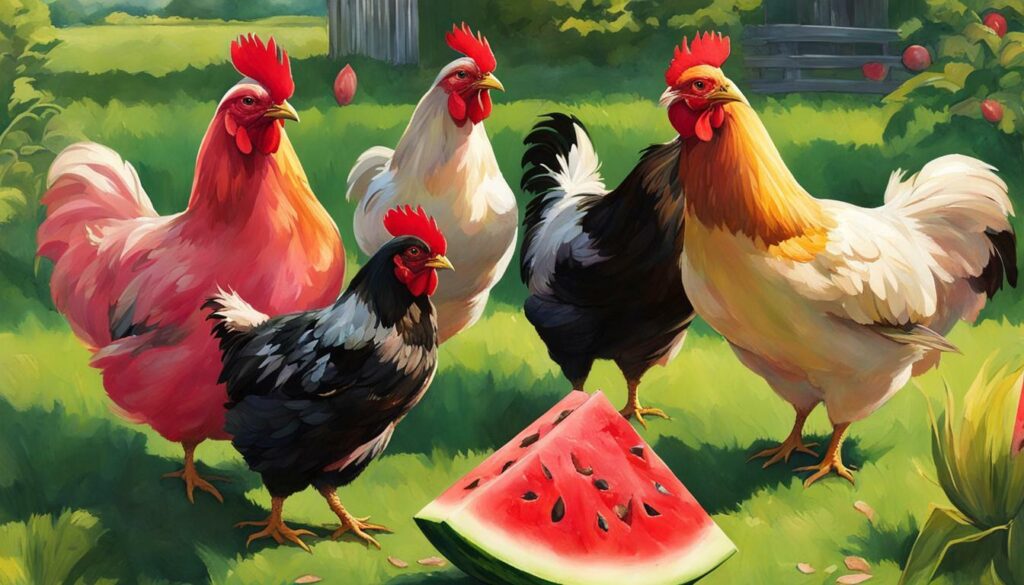
To feed watermelon to your chickens, start by cutting the fruit into small, bite-sized pieces. Remove any seeds or rinds, as they can be difficult for chickens to digest. Alternatively, you can freeze chunks of watermelon for a cool and satisfying summer treat. Just make sure to thaw it before offering it to your flock.
While chickens can benefit from the nutritional value of watermelon, moderation is key. Like any fruit, watermelon should be fed in moderation as part of a balanced diet. Remember, watermelon should not replace their main source of nutrition, which should come from a high-quality chicken feed.
Benefits of Watermelon for Chickens:
- Hydration: Watermelon has high water content, helping chickens stay hydrated during hot weather.
- Vitamins and Antioxidants: Watermelon is packed with vitamins A and C, which support immune health and feather growth.
- Weight Management: Watermelon is low in calories and can be used as a healthy treat without causing weight gain.
As with any new food, it’s important to introduce watermelon gradually into your flock’s diet. Monitor their reaction and ensure it doesn’t cause any gastrointestinal upset. With the proper introduction and moderation, watermelon can be a delightful addition to your chickens’ diet, bringing joy and hydration to their summer days.
Grape Goodness: Can Chickens Have Green Grapes?
Chickens can safely enjoy the juicy goodness of green grapes as part of their balanced diet. These delicious fruits are not only a refreshing treat but also provide essential nutrients that contribute to the overall health and well-being of our feathered friends.
Green grapes are a rich source of vitamins C and K, as well as dietary fiber. They also contain antioxidants that help fight against free radicals and support a healthy immune system. By including green grapes in their diet, chickens can benefit from these nutritional advantages and experience a burst of flavor in their daily meals.
When offering green grapes to your flock, it’s important to ensure that they are fresh and ripe. Avoid feeding them grapes that are overripe or starting to spoil, as these can cause digestive issues for chickens. Additionally, it’s recommended to cut the grapes into smaller, bite-sized pieces to make them easier for chickens to consume.

It’s worth noting that grapes should be given in moderation, as part of a varied diet that includes other fruits, vegetables, and high-quality chicken feed. Too many grapes or excessive consumption of any single food item can disrupt the balance of nutrients in a chicken’s diet. Therefore, it’s essential to provide a diverse range of foods to meet their nutritional needs.
| Benefits of Green Grapes for Chickens |
|---|
| Rich in vitamins C and K |
| Source of dietary fiber |
| Antioxidant properties |
In summary, green grapes can be a wonderful addition to your chicken’s diet. They offer both nutritional benefits and a delightful taste experience for our feathered friends. Remember to offer them in moderation, alongside a well-balanced variety of foods, to ensure their overall health and happiness.
Oil of Oregano for Chickens: Is It Beneficial?
Oil of oregano can be used as a natural supplement for chickens, providing potential health benefits when used properly. This powerful essential oil is derived from the leaves of the oregano plant and is known for its antibacterial, antiviral, and antifungal properties. It contains compounds that can support the immune system, improve digestion, and help maintain overall well-being in our feathered friends.
When using oil of oregano for chickens, it’s important to remember that a little goes a long way. This potent oil should always be diluted before use to prevent any potential irritation or adverse effects. It can be added to their drinking water, diluted in carrier oils for topical application, or mixed with their feed to provide a boost to their immune system.
While oil of oregano can offer potential benefits, it’s crucial to consult a veterinarian or poultry expert before incorporating it into your flock’s diet. They can provide guidance on the proper dosage and usage based on the specific needs of your chickens. Additionally, it’s essential to source high-quality, organic oil of oregano to ensure its effectiveness and safety.
| Benefits of Oil of Oregano | Usage Tips |
|---|---|
| – Boosts immune system | – Dilute properly before use |
| – Supports digestion | – Consult a veterinarian |
| – Antibacterial, antiviral, and antifungal properties | – Source high-quality oil of oregano |
Expert Opinion: Using Oil of Oregano
“Oil of oregano can be a valuable addition to your flock’s health regimen when used correctly. It can support their immune system, aid in digestion, and provide them with natural antimicrobial properties. However, it’s crucial to dilute it properly and seek professional advice to ensure its safe and effective use.” – Dr. Poultry Expert
In conclusion, oil of oregano can be a beneficial supplement for chickens when used in moderation and according to professional advice. It has the potential to improve their overall health and well-being, but caution should always be exercised to avoid any adverse effects. With the right approach, oil of oregano can be a natural and effective way to support the health of our feathered friends.
Minty Fresh: Can Chickens Eat Mint?
Chickens can safely enjoy the fresh taste of mint and reap some potential benefits from this aromatic herb. Mint is not only a delightful addition to our culinary creations, but it can also provide some advantages for our feathered friends.
Mint contains essential oils that have been known to have antimicrobial and digestive properties, which can help support the overall health of chickens. Additionally, its refreshing flavor can be a natural way to encourage chickens to consume their feed or water, especially during hot summer months when they may need extra hydration.
When feeding mint to chickens, it’s important to do so in moderation. While it can be a healthy addition to their diet, excessive consumption may cause digestive upset. Introduce mint gradually, starting with small amounts, and observe how your flock reacts. If they show any signs of discomfort or digestive issues, it’s best to limit or avoid feeding mint altogether.

In summary, mint can be a refreshing and flavorful treat for chickens, offering potential health benefits. However, it should be given in moderation and monitored for any adverse reactions. Remember, a balanced diet consisting of high-quality chicken feed should always be the main source of nutrients for your feathered friends.
Pumpkin Seeds: A Halloween Treat for Chickens?
Chickens can indeed enjoy the nutritional benefits of pumpkin seeds, making them a delicious and healthy addition to their diet. These tiny seeds are packed with essential nutrients, including protein, fiber, vitamins, and minerals, which can contribute to the overall well-being of your feathered friends.
When feeding pumpkin seeds to chickens, it is important to provide them in moderation. While these seeds offer numerous benefits, they are also high in fat. As with any treat, it’s crucial to maintain a balanced diet for your flock to prevent weight gain or nutritional imbalances.
One way to incorporate pumpkin seeds into your chickens’ diet is by offering them as a special treat during the Halloween season. Not only will your feathered friends love pecking at the seeds, but the festive orange color will also add a touch of seasonal fun to their coop.
Remember, moderation is key! Too many pumpkin seeds can lead to digestive issues in chickens, so it’s important to provide them as an occasional treat rather than a daily snack. A small handful of pumpkin seeds a few times a week can be a great way to keep your flock entertained and satisfied.
Feeding Pumpkin Seeds to Chickens: Tips and Ideas
If you’re wondering how to serve pumpkin seeds to your chickens, here are a few ideas to get you started:
- Roasted: Lightly roast the pumpkin seeds to enhance their flavor and make them easier for your chickens to digest. Simply spread the seeds on a baking sheet and bake at 350°F for about 10-15 minutes, or until they turn golden brown.
- Mixed with Feed: Crushed or ground pumpkin seeds can be mixed with your chickens’ regular feed to add nutritional value and variety to their diet.
- DIY Treat Blend: Create a custom treat blend by combining pumpkin seeds with other safe ingredients like mealworms, dried fruits, or herbs. This will not only provide a nutritious snack but also keep your chickens entertained and engaged.
By incorporating pumpkin seeds into your chickens’ diet in a responsible and creative way, you can provide them with a tasty treat while ensuring their nutritional needs are met. Remember to always monitor your flock’s intake and consult with a veterinarian if you have any concerns or questions regarding their diet.
| Nutrient | Amount per 100g |
|---|---|
| Protein | 30g |
| Fiber | 10g |
| Vitamin A | 16,773 IU |
| Vitamin C | 1.9mg |
| Iron | 8.7mg |
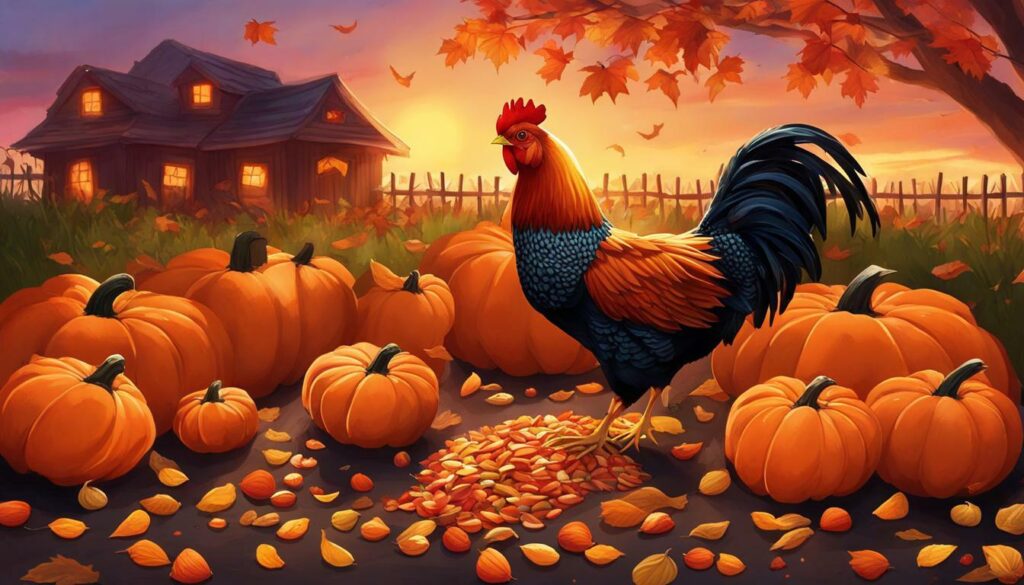
Chickens can safely eat quinoa in moderation, providing them with an additional source of protein and nutrients. Quinoa is a versatile grain that has gained popularity for its numerous health benefits. It is gluten-free, rich in essential amino acids, vitamins, and minerals, making it a valuable addition to a chicken’s diet.
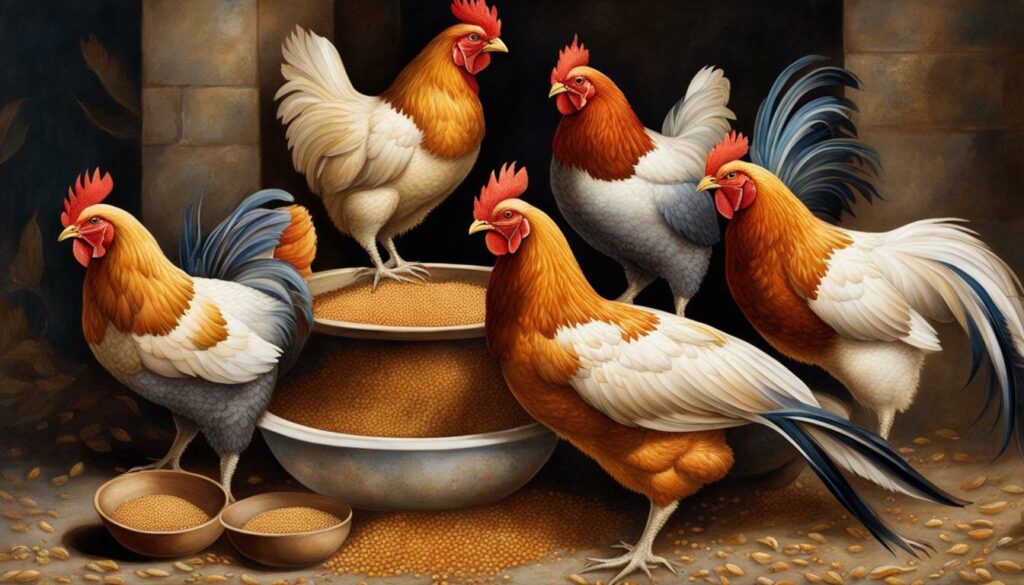
Quinoa can be cooked and served to chickens in a variety of ways. It can be boiled, steamed, or even mixed into their regular feed. Chickens enjoy the taste and texture of quinoa, and it can be a delightful treat for them. Just remember to give it to them in moderation and avoid adding any seasonings or additives that may be harmful to their health.
When feeding quinoa to chickens, it’s important to keep in mind their overall nutritional needs. While quinoa is a great source of protein, it should not replace their main feed. A balanced diet for chickens should consist of high-quality chicken feed that is specifically formulated to provide them with the necessary nutrients. Quinoa can be a nutritious supplement to their diet, but it should not be the sole source of their nutrition.
| Benefits of Quinoa for Chickens | Considerations when Feeding Quinoa |
|---|---|
|
|
As with any new food introduced to chickens, it’s always advisable to start with small quantities and observe how they respond. If they enjoy quinoa and show no adverse reactions, you can gradually increase the amount. However, if you notice any digestive issues or changes in behavior, it may be best to discontinue feeding quinoa and consult a veterinarian.
Walnut Wonders: Can Chickens Eat Walnuts?
Chickens can eat walnuts, but precautions need to be taken to ensure their safety and avoid potential health issues. While walnuts offer nutritional benefits, their hard shells pose a choking hazard and can cause digestive problems if consumed in large quantities. It’s important to properly prepare and introduce walnuts into your flock’s diet.
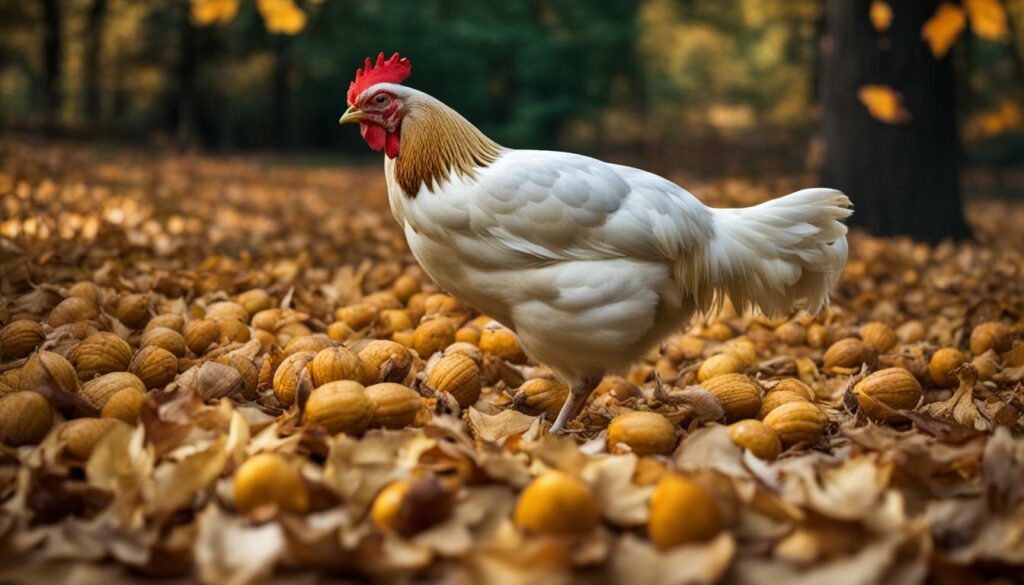
Preparing Walnuts for Chickens
Before offering walnuts to your chickens, it’s crucial to remove the shells. Walnut shells are tough and can be difficult for chickens to break or digest. Cracking open the shells exposes the meaty part of the walnut, which is safe and enjoyable for chickens to eat.
One way to prepare walnuts is by using a nutcracker to crack the shells manually. This can be a fun and engaging activity for both you and your chickens. Alternatively, you can purchase shelled walnuts from a store if cracking them manually is not feasible.
Feeding Walnuts in Moderation
While walnuts offer essential fatty acids and protein, they should be given to chickens as a treat rather than a staple food. Too many walnuts can lead to weight gain and digestive issues in chickens. It’s best to offer walnuts in small quantities as an occasional snack.
| DO | DON’T |
|---|---|
| Crack walnuts and remove the shells before feeding them to chickens. | Feed whole walnuts with the shells, as they can be difficult for chickens to digest. |
| Offer walnuts as a treat in moderation, alongside a balanced diet of chicken feed. | Rely solely on walnuts as a source of nutrition for your chickens. |
| Ensure your chickens have access to fresh water when offering them walnuts. | Feed moldy or rancid walnuts to chickens, as they can cause illness. |
Remember, a high-quality chicken feed should be the main source of nutrients for your flock. Walnuts can be a delightful addition to their diet, but they should not replace the essential nutrients provided by a balanced feed.
In conclusion, chickens can safely enjoy walnuts as long as precautions are taken. Remove the shells to prevent any choking hazards, offer them in moderation, and ensure they are part of a balanced diet. By following these guidelines, you can treat your feathered friends to the wonders of walnuts without compromising their health.
The Egg Dilemma: Can Chickens Eat Eggs?
Chickens can eat eggs, but it’s important to understand the reasons behind this behavior and how to manage it appropriately. While it may seem strange for chickens to consume their own kind, there are valid reasons why they engage in this behavior. It’s essential for chicken owners to be aware of the potential challenges and take necessary precautions to maintain a healthy flock.
Egg-eating among chickens can start as a result of nutritional deficiencies, boredom, or accidental discovery. If a chicken has inadequate access to certain nutrients, they may develop a taste for eggs as a source of vital nutrients. Boredom is another factor that can lead to egg-eating behavior, as chickens may start pecking at eggs out of curiosity or to alleviate their boredom. Additionally, if a chicken accidentally breaks an egg, they may consume it, creating a learned behavior that can be challenging to break.
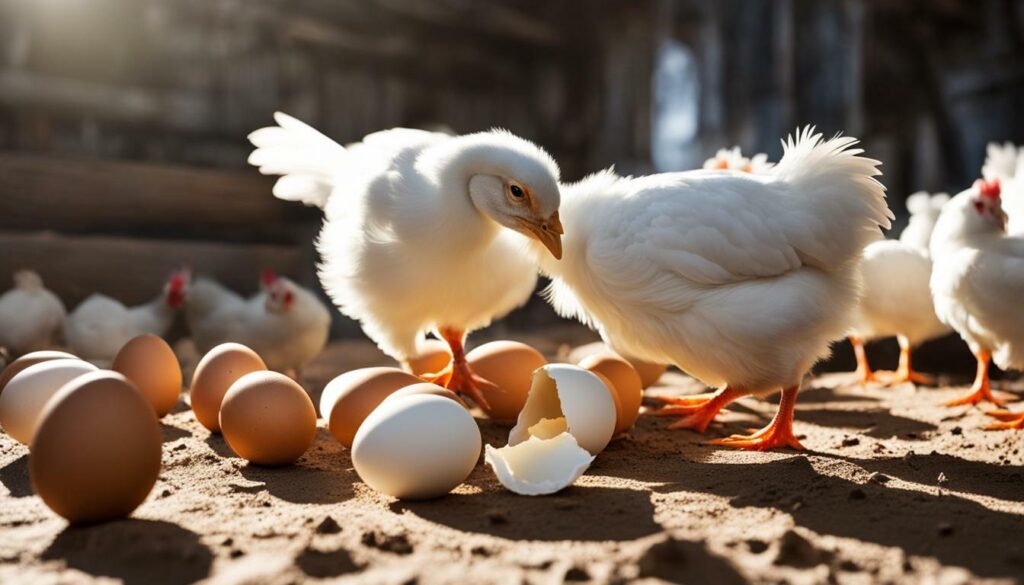
To manage egg-eating behavior, it’s crucial to take preventative measures and address any underlying causes. Providing a balanced diet rich in essential nutrients is the first step in preventing nutritional deficiencies. High-quality chicken feed should be the main source of nutrients for chickens, ensuring they receive all the necessary vitamins and minerals. Supplementing their diet with oyster shells or crushed eggshells can also provide the calcium they need, reducing the temptation to consume their own eggs.
Creating an engaging and stimulating environment for chickens is key to preventing boredom-related egg-eating. Providing plenty of space, toys, perches, and access to fresh greens can keep them mentally and physically stimulated. Regularly checking nests for broken or cracked eggs and promptly removing them can help deter further egg-eating behavior.
In conclusion, while chickens can eat eggs, it’s important to actively manage their behavior to prevent egg-eating habits. By ensuring a balanced diet, providing a stimulating environment, and promptly addressing any broken eggs, you can help your chickens maintain a healthy and egg-laying-focused lifestyle.
A Balanced Diet for Chickens
To keep your chickens healthy and thriving, it’s crucial to provide them with a well-rounded diet that includes the right balance of chicken feed and supplemental foods. While chicken feed serves as the main source of essential nutrients, incorporating a variety of foods can ensure that they receive the necessary vitamins and minerals for optimal health. Here are some key guidelines to consider when planning your flock’s diet.
Chicken Feed:
The foundation of a chicken’s diet is high-quality chicken feed. This specially formulated feed provides a balanced blend of grains, protein, vitamins, and minerals to meet their nutritional needs. Look for feeds that are specifically labeled for the type of chickens you have, whether they are laying hens, broilers, or mixed flocks. The feed should be fresh, free from mold or pests, and stored in a cool, dry place.
When choosing chicken feed, opt for non-GMO or organic options if possible. These feeds are made from ingredients that are free from genetically modified organisms and pesticides, ensuring a healthier diet for your chickens. It’s also important to select the appropriate feed according to your chicken’s age and purpose, as their nutritional requirements vary at different stages of life.
Supplemental Foods:
In addition to chicken feed, chickens can enjoy a variety of supplemental foods to enhance their diet. These foods should be offered in moderation, alongside the main feed, to maintain a balanced intake of nutrients. Here are some safe and nutritious options for your feathered friends:
- Fruits and Vegetables: Treat your chickens to small amounts of fruits like apples, bananas, and berries, as well as vegetables like carrots, cucumbers, and leafy greens. These provide vitamins, minerals, and antioxidants that contribute to their overall health.
- Protein-Rich Foods: Insects, such as mealworms and crickets, are excellent sources of protein for chickens. You can also offer them cooked eggs or fish as occasional treats.
- Grains and Seeds: Including grains like oats and barley, as well as seeds like sunflower and flax, can provide additional energy and essential fatty acids in your chickens’ diet.
Water and Grit:
Water is vital for chickens’ health and digestion, so ensure they have access to clean, fresh water at all times. Additionally, offering them grit, such as crushed oyster shells or granite, aids in their digestion by helping to grind down food in their gizzard.
By maintaining a well-rounded diet that combines high-quality chicken feed with a variety of supplemental foods and ensuring access to clean water and grit, you can provide your chickens with the nutrients they need to thrive. Remember to introduce new foods gradually and observe your chickens’ response to different options. With a balanced diet, your feathered friends will be healthy, happy, and ready to lay those delicious eggs!
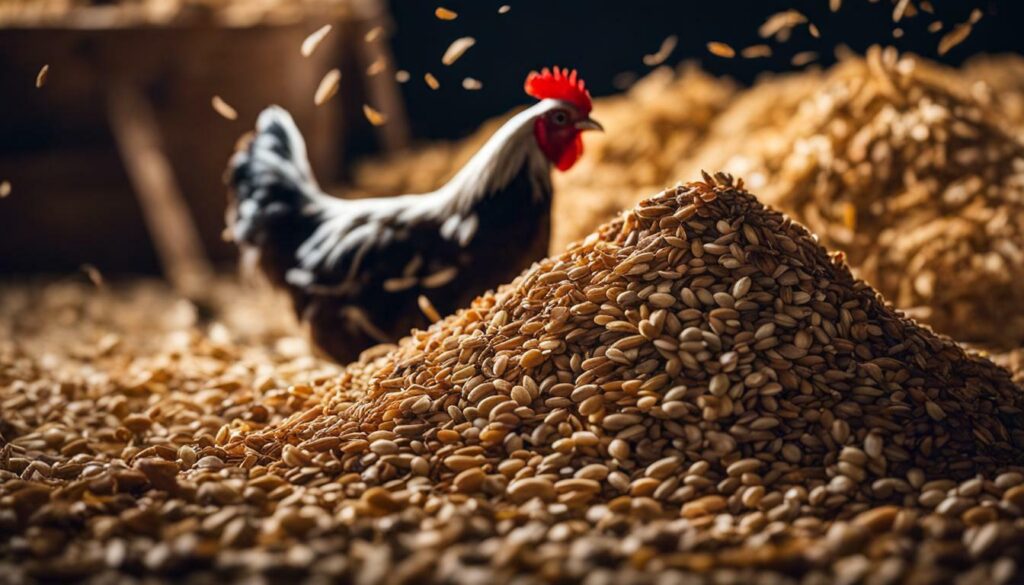
It’s important to know which foods to avoid feeding chickens to prevent potential health issues and keep them safe.
First and foremost, it’s crucial to steer clear of feeding chickens raw beans. Raw beans contain a compound called lectin, which is toxic to chickens and can cause digestive problems.
Salty foods should also be off-limits for our feathered friends. Chickens have delicate kidneys that can be overwhelmed by too much salt intake, leading to dehydration and kidney damage.
Another food to avoid is moldy food. Mold can produce toxins that are harmful to chickens, potentially causing digestive distress, liver damage, and other health complications.
While chickens can handle small amounts of cooked meat, large quantities of raw or uncooked meat should be avoided. Chickens lack the necessary enzymes to safely digest raw meat, and it can put a strain on their digestive system.
Remember, a high-quality feed should be the main source of nutrients for chickens. Providing a balanced diet through chicken feed and occasional treats from safe food options will keep your flock healthy and happy.
FAQ
Can chickens eat blueberries?
Yes, blueberries are safe and nutritious for chickens to eat. They can enjoy these plump, juicy berries as a tasty treat.
Can chickens eat mango?
Yes, chickens can eat mango. This tropical fruit can be a delightful addition to their diet, providing them with vitamins and a touch of sweetness.
Can chickens eat thyme?
Chickens can safely eat thyme. This popular herb can add flavor to their meals and may have some health benefits for them as well.
Can chickens eat chia seeds?
Chickens can eat chia seeds. These superfoods are rich in nutrients and can be a beneficial addition to their diet.
Can chickens eat almonds?
Chickens can safely eat almonds. These crunchy nuts are a tasty and nutritious snack for them.
Can chickens eat watermelon?
Yes, chickens can eat watermelon. This refreshing summer fruit can be a delicious treat for them, especially on hot days.
Can chickens have green grapes?
Chickens can enjoy green grapes. These tangy fruits can be a tasty snack for them in moderation.
Is oil of oregano beneficial for chickens?
Oil of oregano can have some health benefits for chickens. It may help boost their immune system and provide natural antimicrobial properties.
Can chickens eat mint?
Chickens can eat mint. This herb can add a refreshing flavor to their diet and may also have some insect-repellent properties.
Can chickens eat pumpkin seeds?
Yes, chickens can eat pumpkin seeds. These nutritious seeds are a great snack for them, especially during the fall season.
Can chickens eat quinoa?
Chickens can eat quinoa. This healthy grain alternative can provide them with essential nutrients and is a good addition to their diet.
Can chickens eat walnuts?
Chickens can eat walnuts. These nutritious nuts can be cracked open by chickens and enjoyed as a tasty treat.
Can chickens eat eggs?
Chickens should not be fed their own eggs. While they can eat cooked eggs as a source of protein, feeding them raw eggs may lead to egg-eating behavior.
What should be included in a balanced diet for chickens?
A balanced diet for chickens should primarily consist of a high-quality feed that provides them with the necessary nutrients. Supplementing their diet with safe fruits, vegetables, and grains can also be beneficial.
What foods should be avoided when feeding chickens?
Chickens should avoid consuming raw beans, salty foods, moldy foods, and large portions of uncooked meat. These can be harmful to their health and should be kept away from their diet.

